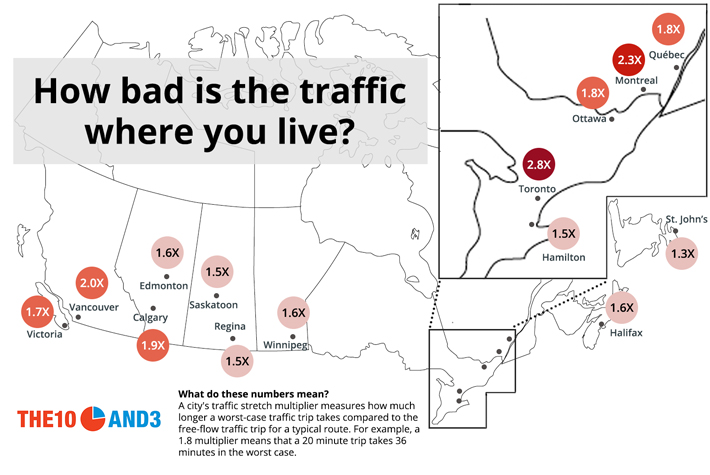Also discussed here: Which Canadian city has the worst traffic? (Alexandra Pope, Canadiana Geographic, Dec. 10, 2015)
And here: Vancouver has the worst traffic in Canada, new congestion study claims (Jake Edmiston, National Post, Mar. 31, 2015)
And here: TomTom Traffic Index - Measuring congestion worldwide (TomTom, 2016)
Today we review new data showing which city has the worst traffic. By one measure, TomTom’s 2014 traffic index show Vancouver with 35% as the worst, followed by Toronto (31%), Ottawa (28%) and Montreal during the day but this changes during the evening rush hour to Toronto and Vancouver tied at 66% followed by Ottawa at 63%. Another measure, the average stretch multiplier, the ratio between free flowing and congested traffic, shows Toronto as the clear winner/loser with 2.8 with Calgary and Ottawa gaining rapidly as equally sprawled and growing large cities.

Key Quotes:
“the Canadian gridlock problem cost the average commuter nearly 79 hours last year, up from 77 hours in 2013”
“Vancouver again ranked third in North America — just behind the notorious traffic of Los Angeles and Mexico City.Toronto was a close second to Vancouver in the Canadian rankings, with Ottawa and Montreal taking the third and fourth spots respectively. Edmonton and Quebec City tied for fifth and Calgary had the honour of finishing last”
“Zack Gallinger and Arik Motskin studied how long it would take to travel a variety of routes in major Canadian cities during free-flowing traffic and during a worst-case scenario* traffic jam. They called the ratio between these two trip times the “traffic stretch multiplier. Unsurprisingly, Toronto tops the list with an average traffic stretch multiplier of 2.8. The problem, the study’s authors say, is the city’s highways are ill-equipped to deal with the population density of the surrounding communities.”
“While a trip downtown from dense residential areas like Markham in the north or Scarborough in the northeast could take under a half hour in free-flow traffic, commuters in peak traffic can expect a voyage of well over 75 minutes,”
“growing cities like Calgary and Ottawa are beginning to feel traffic pressure: certain routes within those cities can produce traffic stretch multipliers of 2 or more during worst-case scenarios.”







No comments:
Post a Comment